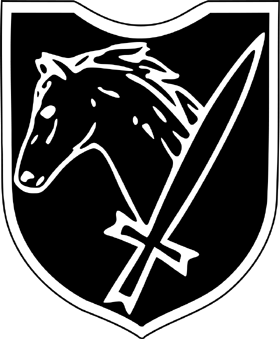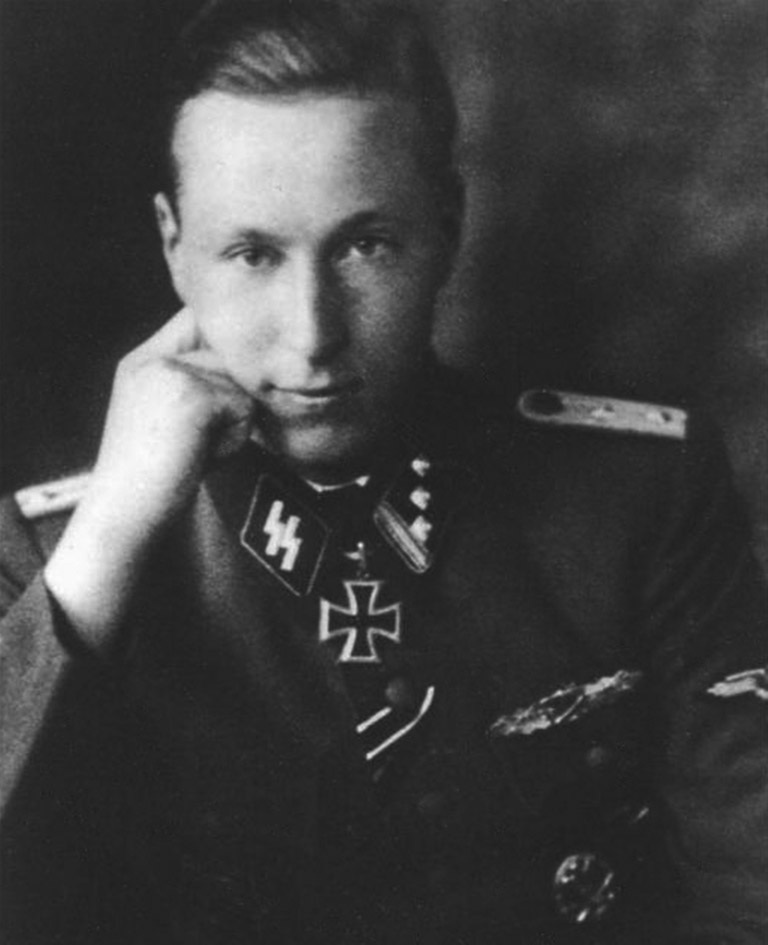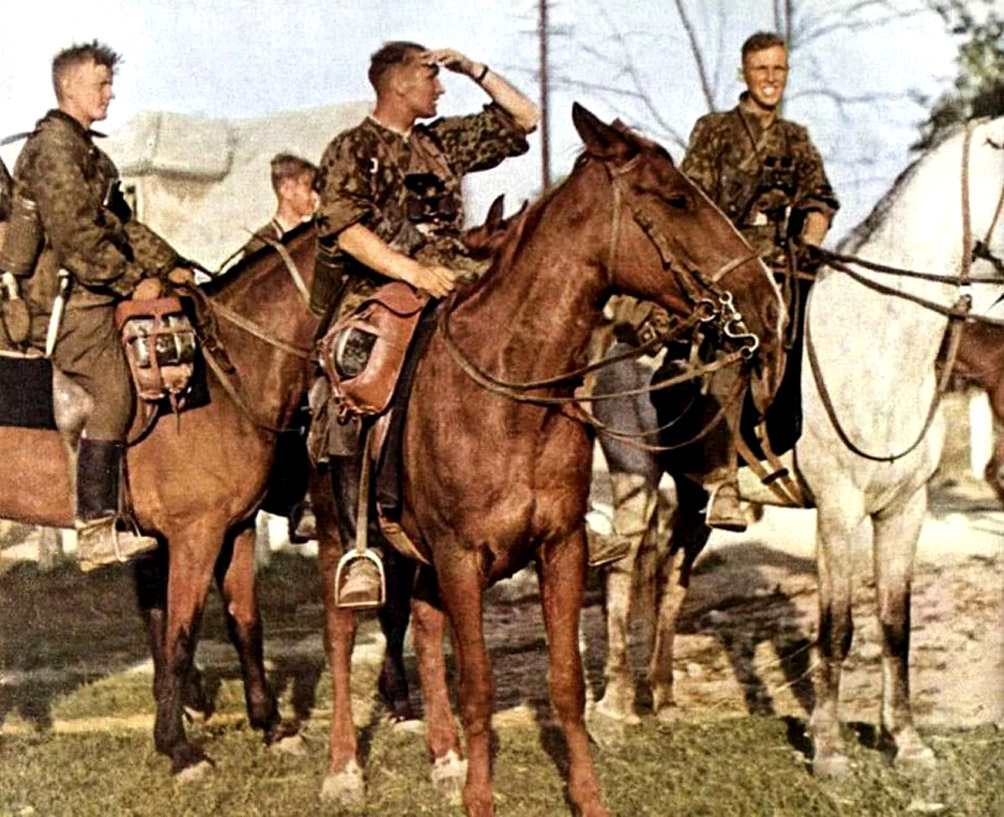

Interview with SS-Hauptsturmführer Joachim Boosfeld, Knight's Cross winner and Commander of 8. SS-Kavallerie Division Florian Geyer, Ramstein, 1998.



Interview with SS-Hauptsturmführer Joachim Boosfeld, Knight's Cross winner and Commander of 8. SS-Kavallerie Division Florian Geyer, Ramstein, 1998.

Thanks, for meeting with me Colonel [Boosfeld went on to serve in the German military after the war, retiring in 1981], can I ask what attracted you to join the
SS?
Joachim: Yes, in the Germany under Hitler, the SS was seen as a very elite,
intelligent, and upwardly mobile group of men. Himmler built a small army
from the old guard, which by 1939 was becoming recognized as a military
force. You could say I was impressed by what I saw in the papers and books,
seeing the sharp looking men in their black uniforms with impeccable
military bearing.
After I graduated school, I really saw no quick path to success, I was
fond of horses and the SS had a top-notch cavalry school based on the old
Lifeguard Hussars of the German Kaisers; the SS provided that path I sought.
I was almost 18 and applied when the war started. I was accepted on the 9th
of November, a sacred day back then. I entered in later November and met
friends who knew men in the Panzers; I had a decision to make, whether to
go to the cavalry or the Panzer arm.
The recruiters of course made the Panzers out to be the new cavalry
and told me to picture myself as a panzer commander. I picked the cavalry as
I felt I would fit better, and from what I was told, it was a tight knit group
and somewhat relaxed with good leadership. They really wanted me to go to
the Panzer arm, but my will prevailed and I eventually made my way to
cavalry school.
Why did the SS use a skull as its insignia, was it to show allegiance to evil?
Joachim: No, if you know anything about German history you will notice the
skull and bones goes way back. Himmler took the symbol of the old black
lifeguard hussars and modernized it. It was a symbol to represent devotion
until death, nothing more. The literature available back then explained it well;
it is steeped in German tradition and means nothing sinister or evil. It was
one of the tenants from the Kaiser-time the SS kept, honoring the history of
our country and people.
The Allies had powerful propaganda that was able to spin a powerful
tale to a gullible public, and to make us out to represent and be something we
were not. Many men were shot for wearing that symbol, because their
enemies had been told this represented evil, death, and no prisoners.
Were you a member of the NSDAP? Did all the SS have to join?
Joachim: No, the NSDAP was a political party, just like the democrats and
republicans. Now, it was suggested that members of the SS be party members,
but it was not a requirement. This probably helped me in the end, after the
war. I had no desire for politics, and only wanted to be a soldier. I had nothing
against Hitler and the NSDAP; indeed, they did wonderful things for
Germany until the war. At no time did anyone, or I, receive a hard time for
not being in the party.
What was you training like in the SS?
Joachim: It was very regimented; we got up at the same time, went to bed at
the same time, and had different training each day. SS training was different
from army training in that, the purpose was to educate, not break one down.
We did have to answer for any infractions, according to our NCO, but we
were not treated as animals.
I had an immediate sense of belonging and after a few weeks, I was
sent to Panzer training, which focused on mobile warfare. I was able to
change to cavalry but learned a lot about Blitzkrieg tactics. This was an odd
time to go into the cavalry, as the Panzers were quickly making this old form
of warfare obsolete. Our role in the Blitzkrieg was to be used in mopping up,
fighting and scouting in areas the Panzers could not go.
Once in cavalry school our lives were made easier, we had more
freedom, could go into town, and it was very relaxed. Many of the men were
both animal and nature lovers. We would take the squadrons on mock war
games, and patrols, sometimes lasting days. We received training on hunting
down enemy soldiers who were in hiding, which later in the war meant
hunting bandits.
The food was always good, and the locals always glad to pet the
horses and offer them an apple. We would have days where the children could
come for rides and tour the stables. The men liked this as the pretty nannies
and daughters would accompany the kids, and it was a good opportunity to
show off, as soldiers do.
Did you wear the black uniform, or the field grey? Did you wear a cuff title?
Joachim: I came into the SS during a time of war, so the uniform was the field
grey of the German armed forces. It was no different from the army uniform,
save for the insignia which had the runes, and eagle on the arm instead of the breast. The black duty uniform was pre-war, and during the war all SS
members were required to wear the field gray uniform, as the SS was
considered a military arm.
The cuff titles were honorary names given to SS regiments and
divisions to honor people famous in either German or National Socialist
history. Each regiment was responsible for acquiring and handing out titles.
All early SS units wore titles, but strangely, not every soldier wore one. There
would be those who missed the handing out and never had a chance to get
one sewn on. Later in the war, it was common to not wear one, as it could get
you shot.

[Above: Florian Geyer cuff title.]
What were your early experiences like, and your first action in the war?
Joachim: I completed my training by mid-1940 but was promptly sent to
NCO leadership school, as my leaders saw I was very adept to the cavalry
and related well to the other men. This course lasted a few weeks, and by the
time I re-joined the regiment it was in Poland doing security sweeps. These
mainly consisted of riding out to distant villages to meet the people and make
sure they were not being bothered. South Poland was the site of brutal ethnic
fighting and we were tasked with keeping peace among many ethnic peoples.
We would once in a while come across small bands of Polish soldiers who
were hiding out, refusing to surrender. My unit once came upon a group of
about 20 that looked like Roma, which included the wives and children of
men who wore uniforms. We thought it quite funny that they were doing this
and did not need to. They had one rifle with 10 rounds and a shotgun for
hunting. Our leader, SS-Obersturmbannfüuhrer Fegelein, left them alone as
they were not hurting anyone. They seemed peaceful and there were no
reported incidences in this area. This was what our lives were like behind the
lines. We ate lunch with them, and then rode off leaving them be. They
seemed surprised by this, but our mission was not to inflict undue hardships
on the population. Most of my time was like this, very boring you could say,
and that was good with me. Other squadrons had trouble with escaped
prisoners, deserters, or partisans, that resulted in fights, but this was very rare.
My first real action was fighting a large group of allied supplied
Polish army bandits who had attacked a German settlement and inflicted
casualties on civilians. This was a hard fight, as they were well defended, and
though we killed or captured many, a good number escaped with the help of
allied agents. We saw our first casualties, and I helped one of our men with
giving last rites to those who needed it.
I was recommended for, and sent to, SS officer school before the
start of the war in the east. It is a funny thing, I knew we would be at war
with the Soviets within a few months. When in Poland, we were sometimes
close to the demarcation line and could see their cavalry spying on us, and
occasionally a plane would fly overhead. They were scouting our positions
and movements it seemed. We came to a village once where they swore
Russian soldiers had come through asking about our strength and positions.
It was reported they took a young man with them to draw maps of the area.
To me this was preparation work for an attack. Perhaps Hitler was not as
crazy or incompetent as his enemies claim, when he attacked the Soviets.
In the east we were used as rear area security, mainly fighting
bypassed red soldiers who stayed organized, despite not having command
and control elements. By this time, we added heavy weapons including
mortars, machine guns, and artillery. We were quite a formidable, mobile
force; we took on frontline Red soldiers and defeated them.

[Above: Men of the SS Cavalry Division 'Florian Geyer'.]
Was your unit ever accused of war crimes?
Joachim: All Waffen-SS units were. I cannot discuss much about this but
recent investigations by the justices have shown we acted within the rules of
war and never mistreated the civilian population. I can attest to you I never
saw any war crimes by German units and would have denounced them if I
did. My men fought with honor and charity to Pole, Russian, and everyone
else we came across. There may have been minor issues of theft or assault,
but our SS courts handled these very harshly to deter further acts.
What about the claims made by many that your unit killed or hunted Jews,
and later killed them?
Joachim: Again, young man, I cannot say much but I will tell you some Jews
sadly chose to join partisan bands and fought us, which was against the rules
of war. They had to be dealt with much like any terrorist in wartime.
Sometimes the penalties were not pleasant and hard to carry out, but these
people knew what they were getting themselves into. I will say most were
peaceful and did not lift a finger against us, so they were left alone in their
villages. We carried police powers with us, so we could do immediate trials
and executions; we luckily did not have to do this often.
Some villages had to be evacuated to get civilians out of the war
zone, and some had to be forced to leave, but this was no sinister action, it
was to protect people from the ravages of war. We went to great pains to help
them remove possessions and animals for safer pastures. However,
sometimes the fighting found them, and they were in the thick of shells,
bullets, and bombs. We tried to avoid this at all costs.
What was your impression of the Russian soldier?
Joachim: I found them to be undisciplined and under trained. Very few were
the fanatical Bolshevists that one might think. When captured, they spoke of
being forced to join the war, and not liking Stalin. One clever thing Stalin did
was making the war one of Germany against Russia, instead of a war on
Communism. This helped unite all of the Soviet states, believing we came to
eradicate the people, which we did not. We only wanted an end of
Communism, and the threat it posed to the world.
Because the Red soldier was undisciplined, they were more prone
to crimes, especially when they made it to enemy territory. In Hungary and
Romania, they were very cruel to the people. They fought the war as
conquerors, like times of old, forcing people to bow to their will. It is
interesting they accuse us of these same tactics, which is not factual; we
wanted to pacify the people by giving them hope for a better future. This
happened in most areas under our control; areas where there were problems
likely had a high concentration of Communists, allied agents who stirred up
the people, or bad interactions with our allies or us.
It is testimony to German arms that in most areas we occupied, you
never hear a peep about crimes or inappropriate behavior. I want to tell you,
it has recently been said the war in the east was brutal and cruel; this is true
in some regards, but mostly false. I was there, I saw the human side of the
Russians, and of our side. We gave much aid to the civil population,
something the partisans tried to disrupt, as they wanted the people against us.
What better way to create anger and resentment than by taking away food,
shelter and safety.
We treated surrendered Red soldiers according to how we would
want to be treated, and they mostly returned the same treatment. After the
war I hear that changed and they are now saying, we killed most all prisoners,
which I would question. I saw many prisoners working behind the lines for
us, on paid details helping to rebuild roads and towns that Stalin's scorched
earth destroyed.
How did it feel to be awarded the Knight's Cross?
Joachim: It is a high honor to wear this medal; however, my men made it
possible. This represents the hard fights we had with the enemy, and the
heavy losses we suffered. I also was awarded the Combat Clasp in Gold, for
50 actions with the enemy in close quarters; this was much harder to earn
than the Knight’s Cross. I was sent to Berlin to receive greetings from the
Führer, and the award, which was a high honor in itself and provided a
respite from the cold and misery of the front.
[Above: During a command meeting of the 8th SS Cavalry Division 'Florian Geyer'. On the left is SS-Brigadenführer Wilhelm Bittrich, 1943. Click to enlarge.]
Did you get to speak to Hitler at length?
Joachim: No, at this stage of the war, the Führer looked tired and forlorn,
everyone knew the war was lost at this point; we were fighting now to help
as many people escape to the west. Starting in late 1943, German strategy
was to act as a defensive barrier and slow the Allies, wearing them down
enough where they would sue for peace. This did not work as planned as they
had far more resources and reserves than our intelligence understood, and we
failed to hold Normandy.
The Führer did thank us all for our dedication and sacrifice. He told
us he wished he could do better to provide us a good time in Berlin, but his
attention had to be on trying to hold the fronts. He spoke of new armies being
built up in secret that would give a hammer blow to the Reds, and then would
be turned on the west. I always wondered who was telling him these fantasies.
It has been rumored there were a few high placed spies who worked for the
east and west.
He did speak of wonder weapons still in the works that may turn the
tide for us; but even he seemed to be worrying about our fate. At any rate,
my time was short in Berlin, and I was glad, everywhere I looked, there was
destruction. I will share with you a strange event I witnessed, while waiting
for a train, I saw camp inmates who had been evacuated from the east. They
looked healthy and well treated, the Red Cross nurses were giving them
coffee and snacks; I was surprised to not see many guards.
Do you believe Germany could have ever won the war?
Joachim: I was fairly well treated by the Americans after the war, as I was
seen more of an instructor than anything. This allowed me to see some of
their training as well. Germany stumbled into the war unprepared, and under
strength, so the war was lost when it began. We had superior soldiers in my
opinion but lacked the resources and manpower to deliver victory. Even the
world's strongest man would fall if 10 other strong men overwhelmed him.
I attended a NATO war discussion, and a West Point person
suggested Germany could have won in this scenario:
1- Focus on building only assault gun/tank killers, not super
tanks.
2- Focus on building U-boats, nothing else.
3- Get Japan to attack Russia in June '41, and send every division
to the Eastern Front, even if understrength so that Moscow falls
by October.
4- Avoid war with the US at all costs, and keep trying to make
peace with England, as she was never the real enemy. Some
may laugh, but this has merits and may have been feasible.

[Above: The brave knights of the 'Florian Geyer'. Russia, 1942.]
Back to Interviews